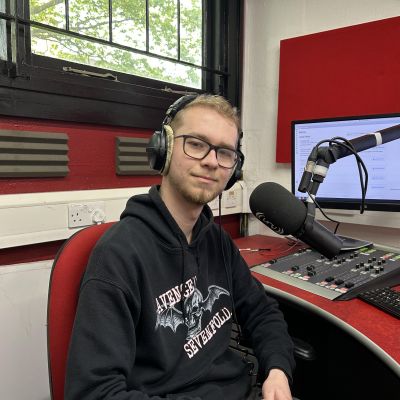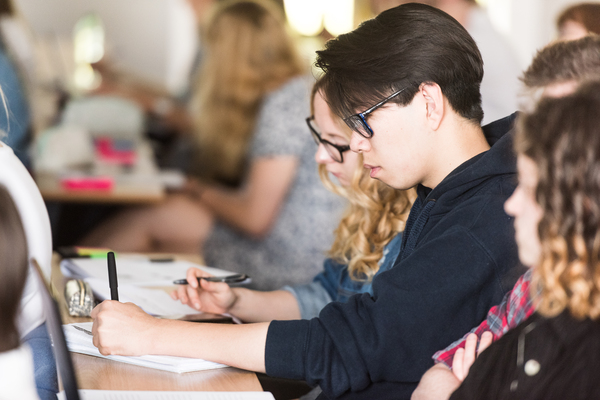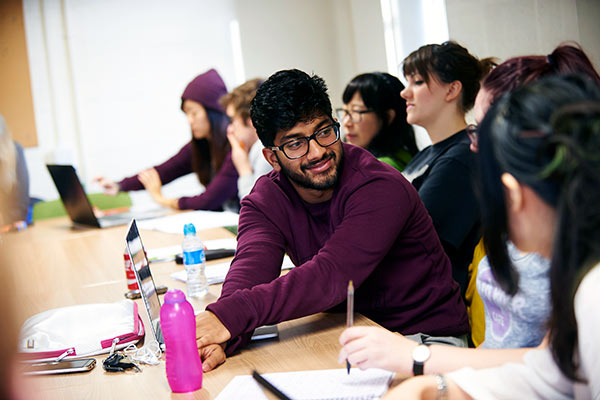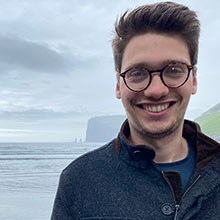View semester dates

BA (Hons) Digital Media, Culture and Communication
Deepen your understanding of how digital culture has changed how we live, interact, create and communicate.
Year of entry: 2026/27
View semester dates
Key transformations in digital technology are shaping our lives. Examine how digital media, culture and communication has changed how we live, interact and create.
Why study Digital Media, Culture and Communication at York?
Learn to analyse and respond to shifts in digital media. You'll be supported by experts in digital media from across a range of disciplines. Under their guidance, you'll make sense of how digital developments shape our lives and experiences.
Explore a wide range of topics within digital media, culture and communication. This includes exploring personal identities, imagining geopolitical futures and examining the impact of AI on decision-making. You'll also delve into how we tell stories and create content in a digital world. In the process, you'll be equipped with the knowledge and skills to realise your ideas.
Develop practical skills in applied modules. Our range of option modules will allow you to tailor your degree to suit your interests. This includes applied modules that cover interactive media, filmmaking and content creation. This allows you to develop a practical skill set within the area of digital media that you're passionate about.
Prepare for your future. During your studies, you'll have access to careers support, events and opportunities. You'll also have the option of adding a placement year to your degree. This allows you to gain invaluable experience working before you graduate. Over the course of your studies, you'll develop a highly flexible skill set and gain knowledge relevant across industries.
Course content
- Year 1 - six core modules
- Year 2 - four core modules and two option modules
- Year 3 - three core modules, including a 40-credit dissertation, and two option modules
The course is based on a combination of core modules covering key aspects of the programme learning outcomes. These are balanced with highly relevant option modules in the second and third years. We have built the programme so that all modules - be they optional or core - speak directly to the programme's core themes.
Year 1
Your first year is based on six core modules that will give you the foundation and understanding of digital media, culture and communication.
Core modules
- Introduction to Media Technologies
- Story for Interactive Media
- Living In Digital Cultures
- Introduction to Digital Culture
- Investigating Social Problems
- Understanding Self in Society
Academic integrity module
In addition to the above you will also need to complete our online Academic Integrity module.
Year 2
Your second year incorporates core modules that will advance your understanding of the issues on the programme. Adding direct specialist knowledge of digital media, culture and communication.
The option modules in the second year then allow you to choose to develop different forms of practical and analytical knowledge. These can be focused on the areas you wish to work in or prepare for your future.
Core modules
- Societies in the Climate Crisis
- Popular Culture, Media and Society
- Questioning Digital Cultures
- Digital Media, Power and Social Change
Option modules
You will study two option modules. Examples can be found below. Some option module combinations may not be possible. The options available to you will be confirmed after you begin your course.
Elective modules
You may be able to replace one option module with an elective module, studying a complementary subject, a language or an interdisciplinary topic.
Year 3
Your third year contains a specialist independent study module that will build on existing knowledge and allow students to design and develop research project work.
This independent study module sits alongside core modules in the first semester that develop your knowledge of the key issues of artificial intelligence and digital storytelling. Your second semester then focuses on the specialisms that you wish to develop further in applied and analytic forms of knowledge.
Core modules
- Dissertation in Digital Media, Culture and Communication
- AI in Society
- The Future of Story: Storytelling in the Digital Age
Option modules
You will study two option modules. Examples can be found below. Some option module combinations may not be possible. The options available to you will be confirmed after you begin your course.
- The Digital Self
- Business and Innovation in Digital Enterprise
- Gaming: Industry and Culture
- Speculative Design
- Object Based Media
Elective modules
You may be able to replace one option module with an elective module, studying a complementary subject, a language or an interdisciplinary topic.
Our modules may change to reflect the latest academic thinking and expertise of our staff, and in line with Department/School academic planning.
Learning outcomes
Every course at York has been designed to provide clear and ambitious learning outcomes. These learning outcomes give you an understanding of what you will be able to do at the end of the course. We develop each course by designing modules that grow your abilities towards the learning outcomes and help you to explain what you can offer to employers. Find out more about our approach to teaching and learning.
Learning outcomes for this course
- Understand and respond to developments in digital technologies and their implications for contemporary culture and communication.
- Critically evaluate accounts of the impact of digital media, culture and communication upon individuals, groups and social structures.
- Design and conduct research that creates insights into the implications of a variety of developments in digital media, culture and communication.
- Create detailed and creative accounts of the changes brought about by transformations in digital media, culture and communication.
- Situate developments in digital media, culture and communication within wider social, cultural and environmental transformations.
- Use a knowledge of wider debates and perspectives to produce contextualised arguments, findings and analyses.
- Identify, interrogate and assess the properties of key present and future changes brought about by developments in digital technologies.

I have found Digital Media, Culture and Communication to be an important subject to study because of the broad range of topics that are covered, ranging from modern issues that will directly affect society such as AI, as well background knowledge that provides a basis for current study. So far, my favourite topic has been investigating data extraction in the ‘Living in Digital Cultures’ module because it has provided me with the foundations for an area in which I wish to develop further.
Jack, BA Digital Media, Culture and Communication
Fees and funding
The fees and funding information here is for students starting in the 2026/27 academic year.
If you take a year abroad or year in industry you'll pay a reduced rate of fees for that year.
Annual tuition fees
| UK (home) | International and EU |
|---|---|
| £9,535 (TBC) | £26,900 |
The UK government has announced its intention to increase tuition fees from £9,535 to £9,790 for the 2026/27 academic year. We expect this to apply to new UK (home) undergraduate students starting their studies in September 2026.
UK (home) or international fees?
The level of fee that you will be asked to pay depends on whether you're classed as a UK (home) or international student. Check your fee status.
Fees for subsequent years
- UK (home) fees may increase within the government fee cap in subsequent academic years. We will notify you of any increase as soon as we can.
- International fees are subject to increase in subsequent years in line with the prevailing Consumer Price Index (CPI) inflation rate (up to a maximum of 10%).
More information
For more information about tuition fees, any reduced fees for study abroad and work placement years, scholarships, tuition fee loans, maintenance loans and living costs see undergraduate fees and funding.
Funding
We'll confirm more funding opportunities for students joining us in 2026/27 throughout the year.
York, Oxford, Cambridge, Imperial
Just four UK universities are rated Gold for teaching and top ten for research* in the latest national assessment exercises.
* Awarded joint 10th in the Times Higher Education ranking of the Research Excellence Framework 2021.
Teaching and assessment
You’ll study and learn with academics who are active researchers, experts in their field and have a passion for their subjects. Our approach to teaching will provide you with the knowledge, opportunities, and support you need to grow and succeed in a global workplace. Find out more about our approach to teaching and learning.
Teaching format
Our courses consist of a mixture of classroom-based lectures, seminars, and workshops.
Our research-informed curriculum will provide you with the ability to think critically, develop effective solutions to various work-based problems, and work both independently and as part of a team.
You’ll be taught in a range of specialist subject areas, allowing you to delve deeply into complex topics, explore a whole spectrum of social issues, and develop a resilient, adaptable and challenging mindset that will aid you both within, and beyond, your study.
In the UK, full-time students are expected to spend 1,200 hours a year learning. That's about 40 hours of classes and independent study each week during semesters. Everyone learns at a different rate, so the number of hours you spend on independent study will be different to other students on your course.
Teaching location
You will be based in the Department of Sociology on Campus East. Your teaching will take place at various locations across Campus East and Campus West.
About our campus
Our beautiful green campus offers a student-friendly setting in which to live and study, within easy reach of the action in the city centre. It's easy to get around - everything is within walking or pedalling distance, or you can use the fast and frequent bus service. Take a campus tour.
Assessment and feedback
The programme uses standard assessment methods such as essays, coursework, and reports along with non-standard assessments, which may include:
- Reflective portfolios - where you are invited to develop your own case studies or reflect on your learning experiences
- Book reviews - where you will review a text you have read offering insights and critique
- Design prototype - where you will design an interactive media system
- Creative project work - where you will devise your own project, research a topic and communicate your findings in a media format of your choosing.
- Speculative design prototype or group design brief - where you will develop a design to address a digital media problem or issue.
Careers and skills
By enabling you to analyse and respond creatively to cutting edge digital developments, this course helps you to develop excellent employability skills that can be utilised in a range of different future careers.
You'll have the opportunity to take modules that will not only allow you to develop practical skillsets, but also engage with our external partners to see how these skills can be applied in the workplace.
Career opportunities
- Creative industries
- Marketing
- Public relations
- Social media
- Communications
Transferable skills
- Research and analysis.
- Digital creativity.
- Communicating complex ideas
- Real world applications
- Source and evaluate information
- Creative communication
Entry requirements
| Qualification | Typical offer |
|---|---|
| A levels | ABB |
| Access to Higher Education Diploma | 30 credits at Distinction and 15 credits at Merit or higher |
| BTEC National Extended Diploma | DDM |
| European Baccalaureate | An overall average of 75% |
| International Baccalaureate | 34 points overall |
| T levels | Distinction overall T Level subjects in Accounting; Design and Development for Engineering and Manufacturing; Design, Surveying and Planning for Construction; Digital Business Services; Digital Production, Design and Development; Digital Support and Services; Engineering, Manufacturing, Processing and Control; Finance; Health; Healthcare Science; Legal Services; Maintenance, Installation and Repair for Engineering and Manufacturing; Management and Administration; Marketing; Science |
| Scottish Highers / Advanced Highers | Scottish Highers - ABBBB Advanced Highers - not required for entry We may also be able to consider three Advanced Highers or a combination of Highers and Advanced Highers, where an applicant does not meet the grade requirement through Highers alone. Please contact us to discuss your qualifications. |
| International foundation programme | Foundation Certificate from our International Pathway College or an appropriate alternative. |
| Other international qualifications | Equivalent qualifications from your country |
Alternative offers
Meeting the following additional criteria may qualify you for an alternative offer.
| Criteria | Adjustment |
|---|---|
| Widening participation | BBC This is conditional upon successful completion of the WP programme including the YorJourney module (Black Access Programme, Next Step York) or successful completion of Realising Opportunities More about widening participation. |
| Contextual offer | BBB |
| EPQ | If you achieve C or higher in the EPQ, you may be eligible for an alternative offer up to one A level grade (or equivalent) below our typical offer. |
| Core Maths | If you achieve B or higher in Core Maths, you may be eligible for an alternative offer up to one A level grade (or equivalent) below our typical offer. |
| MOOCs | If you successfully complete our online course Imagining York: Discovering the everyday , you may be eligible for an alternative offer up to one A level grade (or equivalent) below our typical offer. Details about how to evidence completion of the MOOC will be sent in your offer letter. Please note: you do not need to pay for the certificate. More about MOOCs. |
English language
If English isn't your first language you may need to provide evidence of your English language ability. We accept the following qualifications:
| Qualification | Minimum requirement |
|---|---|
| IELTS (Academic) | 6.5, with a minimum of 6.0 in each component |
| IB English | A score of 4 in English A or 5 in English B (Higher Level or Standard Level) |
| Cambridge CEFR | 176, with a minimum of 169 in each component |
| Oxford ELLT | 7, with a minimum of 6 in each component |
| Oxford Test of English Advanced | 136, with a minimum of 126 in each component |
| Duolingo | Integrated subscores: 120 overall, with a minimum of 105 in each component |
| GCSE/IGCSE/O level English Language (as a first or second language) | Grade C / Grade 4 |
| LanguageCert SELT | B2 with a minimum score of 33/50 in each component |
| LanguageCert Academic | B2 with a minimum score of 33/50 in each component |
| Kaplan Test of English Language | 478 Main Flight score with 444 in each component |
| Skills for English | B2: Merit overall, with Pass with Merit in each component |
| PTE Academic | 61, with a minimum of 55 in each component |
| TOEFL | 87 overall, with a minimum of 21 in each component (taken before January 2026) 4.5 with 5 in Listening and 4.5 in each other component (taken after January 2026) |
| Trinity ISE III | Merit in all components |
| Other English language qualifications | We also accept other English Language qualifications, including various school-leaving certificates. |
For more information see our undergraduate English language requirements.
If you haven't met our English language requirements
You may be eligible for one of our pre-sessional English language courses. These courses will provide you with the level of English needed to meet the conditions of your offer.
The length of course you need to take depends on your current English language test scores and how much you need to improve to reach our English language requirements.
After you've accepted your offer to study at York, we'll confirm which pre-sessional course you should apply to via You@York.
Next steps
Related courses
Discover York









